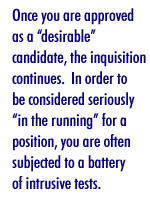

I looked through the Sunday classifieds and reread one of the ads I had highlighted. “Human Resources Administrative Position: Entry Level in growing company. Send cover letter, resume, 3 letters of reference, and salary history to P.O. Box ...” it read.
A cover letter seemed like a good place to start. As I typed the date, I realized that it was only a short time ago when people of all ages and races were captivated by patriotic parades and gazing at bursts of beautiful lights in the sky in a “glorious” celebration of our nation’s independence, and their love for the freedom it provides. I wondered if these same citizens, carrying sparklers and adorned in red, white, and blue, recognized how often our Constitutional rights are infringed upon. I wondered if any realized that our employers, and potential employers, trample on our right to privacy as swiftly and easily as the bands marched to the beat of the national anthem on Independence Day.
In an age of fierce competition, businesses go to great lengths to secure their rights, as well as to protect their definition of the “corporate image.” Companies institute numerous hiring procedures, formulate some questionable policies, establish codes of ethics, monitor employee’s actions, install software to control computer access, and set up firewalls to guard against hackers and unwelcome visitors — all “necessary” actions to protect their interests and trade secrets. At the same time, these measures of control infringe upon our right to privacy and constrain our behavior. Essentially, our guaranteed Constitutional right to privacy directly conflicts with a company’s right to protect its own interests.
JOB OBJECTIVE: Entry level position in Human Resources...
Our private lives are scrutinized before we ever even begin a job. Résumés disclose personal information, more than can be generated from almost any other source — name, address, phone numbers, educational background and employment history. Although the standard résumé leaves out some “personal” facts, much can be inferred by the information it contains. Your résumé can indicate demographic information. Simple math can give a rough estimate of an applicant’s age, and your work and school history can suggest your social and economic status. Résumés, therefore, subject us to inaccurate perceptions, and possibly even “inadvertent” discrimination.
Job applications are more intrusive; most ask for additional information, such as social security number and driver’s license number. With this data, a potential employer has access to other information — credit history, criminal record, and workman’s compensation claims. Although some of these records are protected by certain laws, these background checks are frequently used by employers. Some companies even hire outside investigation firms to do thorough checks. Candidates are asked to sign liability waivers for the company’s protection, and of course, by refusing to sign a waiver in the name of invasion of privacy, you most likely won’t get a job offer. Consequently, once you waive your rights, your claim to invasion of privacy no longer exists.
EXPERIENCE: April '95 to present...
Some applications inquire extensively about your work history, requiring your work experience for the previous 10 years, and demanding clear explanations for all gaps in employment dates. So not only do you have to account for what work you did, but work that you didn’t do. I suppose “just felt like screwing around” or “really got sick of working” aren’t acceptable answers, even though that can be easily assumed by lack of a sufficient explanation.
In addition, some companies want to know how much you were paid at each job. I looked at the ad’s request for salary history, and I wondered what right they had to know that I haven’t made diddly-squat. There is no relationship between salary history and the ability to perform, and confidential information about previous wages is irrelevant to a position in a different company with a new set of responsibilities. Numerous negative assumptions can also be made about a job candidate in light of this information. Based on salary figures, a potential employer could either assume that the candidate was too lazy to find other employment, or worse yet, unable to find a better job. By supplying salary history, you provide personal information that is subject to different interpretations. Numbers can’t explain your pay, or the circumstances upon which the job was accepted; numbers alone can be misconstrued.
Once you are approved as a “desirable” candidate, the inquisition continues. In order to be considered seriously “in the running” for a position, you are often subjected to a battery of intrusive tests. Many companies rely on various screening devices, such as psychological tests, integrity tests, and drug tests, to eliminate candidates that won’t fit their model of a “good” employee.
EDUCATION: University of...
 Psychological tests have been used since the 1950s, but the industry boomed in 1988 after polygraphs were banned for most employment situations. Employers can choose from a variety of tests; some screen for emotional disorders, and others pry into your religious beliefs and sexual habits. Some tests even claim to measure the likelihood that the candidate will have accidents, or the possibility that he or she will quit shortly after being hired.
Psychological tests have been used since the 1950s, but the industry boomed in 1988 after polygraphs were banned for most employment situations. Employers can choose from a variety of tests; some screen for emotional disorders, and others pry into your religious beliefs and sexual habits. Some tests even claim to measure the likelihood that the candidate will have accidents, or the possibility that he or she will quit shortly after being hired.
The simplest and most frequently used tests concentrate on screening for theft, drug abuse, and violence. Publishers of these tests claim that 30% of all employees steal, scaring employers into purchasing their merchandise to make money. More accurate studies indicate that only about 5% of employees steal. In addition, publishers don’t define “theft,” so without an explanation, these figures are subject to the reader’s interpretation. Theft, depending on the definition, could range from accidentally taking home a paperclip to intentionally taking money.
The main purpose of testing is to evaluate a potential candidate’s “propensity to steal.” Ridiculous questions like “How often do you brush your teeth?” are asked in order to compare the candidate’s traits to those of known criminals. These tests are objective; candidates must choose true or false or one of several multiple choice answers. Tests don’t allow for subjective responses, or for responses other than their designed answers, which is really not a “choice” at all.
Testing experts know how criminals have answered, and compare answers for similarities. However, responses that are similar to a known criminal’s doesn’t necessarily mean that the person will steal, it might only indicate that the person is more likely to steal. Also, many integrity tests will produce false positives, so many qualified candidates are unjustly suspected, and then rejected for a position.
HOBBIES AND INTERESTS: Enjoy...
Another commonly used screening device is drug testing, which can be done through urine or blood analysis and hair sampling. The “logic” behind these tests is that drug users will steal in order to sustain their habit. This conclusion implies that all drugs are habit-forming, that all drug users are addicted, and that all those with an addiction will steal. Assuming addicts have a greater tendency to steal, then why screen only for drugs, ignoring other addictions like alcohol, nicotine, food, or sex? Apparently the “ideal” employee can be addicted to anything else but drugs.
Screening candidates for drug use also screens their social life, which is immaterial to job performance. If candidates use drugs on their own time, it wouldn’t necessarily follow that they will perform poorly at work, or that they will use drugs on the job. Studies show that poor work performance and resulting accidents usually occur from factors other than drug use, like being up all night with a sick child, working two jobs to make ends meet, or studying late at night to get a better job. Despite these arguments, many companies only make job offers conditional upon the results of a clean drug test. Again, candidates, whether “drug addicts” or not, have the choice to either comply or look for work elsewhere.
Unfortunately, attempts to weed out “criminals” and “drug addicts” also eliminates some talented people. Testing gives a restricted, momentary glimpse of candidate, without consideration of other factors. People change, as do their situations, and test results will vary due to these changes. To base hiring decisions on results that vary is pointless. Predicting who will steal based on test results, which are often inaccurate anyway, is a futile attempt to control the work environment. Demographic studies indicate that workplace criminals range from the young, economically disadvantaged high school dropout to white, college-educated male managers in their fifties. Virtually anyone could steal; digging into peoples’ psyche and their personal lives will not guarantee a workplace free of problems.
SPECIAL SKILLS: Proficient in ...
 After accepting a job offer, the employer continues to control the work environment. Changes in society have resulted in fear — fear of security breaches, fear of losing “quality,” fear of legal liabilities — so employers implement various restrictive policies, regulating their employees’ social and professional behavior at the same time.
After accepting a job offer, the employer continues to control the work environment. Changes in society have resulted in fear — fear of security breaches, fear of losing “quality,” fear of legal liabilities — so employers implement various restrictive policies, regulating their employees’ social and professional behavior at the same time.
Over the years, society has changed, and the workplace along with it. Dual-income households are the norm, women comprise a larger portion or the workforce, and employees spend larger quantities of time working, trying to advance in a competitive job market. As a result, most social relationships — friendships and romances — evolve in the workplace. It is natural, with employees working 40 or more hours a week, to develop relationships with co-workers. Most companies, however, disapprove of these relationships, and develop policies to discourage them.
Afraid of claims of favoritism, possible sexual harassment, and potential conflicts, employers determine that social relationships are not proper. Establishing policies prohibiting fraternization might eliminate some legal problems, but forbidding relationships is an unrealistic expectation. Employers assume that employees are not capable of balancing their professional and personal lives, thus ignoring employees’ rights to socialize with whomever they choose.
Pagers, cellular phones, email, voice mail, and the Internet have also changed society and the workplace. These technological advances improve communications, resulting in greater efficiency and productivity. Employers are now concerned that employees will be surfing the Net and sending improper email messages, and, as a result, will be less efficient and counterproductive.
Under the pretense of “quality assurance,” employers will legally monitor business calls, track employee use of the Internet with software, and consistently inspect email transmissions for problems. Many employees, with their own email address and access code, assume that their communication is private; however, this is often untrue. The Electronics Communications Privacy Act, a federal law, has been interpreted by the courts to give private sector employers the right to intercept business calls and inspect email. Unfortunately, current technology, intended to be a “looser” and quicker means of communication, becomes restricted in content and constrains an employee’s creativity when monitored by the employer.
REFERENCES FURNISHED UPON REQUEST
Although there are numerous ways for companies to justify their actions, and many complicated legal issues are also involved, these practices are insulting to good employees who value privacy, freedom, and autonomy.
Employers claim that they try to “set a tone for morality within an organization,” and that by screening candidates and implementing certain policies, employees will recognize that they seek “moral and just” workers. By screening out potentially “bad” employees, they help form the employee mindset of honesty and integrity. Screening devices, they claim, stress the company’s desire for these qualities. Employees will then view the environment as ethical, will be less likely to commit any wrongdoing, and will be more likely to assist in internal sting operations against co-workers who are behaving unethically. However, in their effort to establish what is ethical, companies set a tone of immorality and unfairness by assuming the worst and responding accordingly. Corporations assume that employees are corrupt and immoral, incapable of ethical behavior — both professionally and socially — without interference and regulation.
Moreover, these practices suggest not only that employees are incapable of ethical behavior, but that they are also incapable of performing their jobs well. Monitoring employees’ actions to insure quality not only disrupts the workplace, but also stifles creativity and expression, hindering their performance.
Ironically, companies also restrict the actions of those that actually hire the employees, limiting their power to hire anything but the “model” employee. Policies dictate that a candidate should have certain qualifications, X number of references, and pass X number of tests, giving those responsible for the ultimate decision little input into the decision anyway. Essentially, the company has already made most of these decisions about the candidate, indicating that they don’t even trust those they’ve already hired to make a legitimate decision about future employees.
Some people, oblivious to their right to privacy, feel if you have “nothing to hide,” then you have nothing to fear. What they don’t realize is that these efforts to insure that behavior is “proper” and conforms to the corporate image are simply methods of corporate and social control.
REVISED JOB OBJECTIVE: To obtain a position free from bureaucratic constraints and social censure ...

Back to August/September '97 Issue
 Psychological tests have been used since the 1950s, but the industry boomed in 1988 after polygraphs were banned for most employment situations. Employers can choose from a variety of tests; some screen for emotional disorders, and others pry into your religious beliefs and sexual habits. Some tests even claim to measure the likelihood that the candidate will have accidents, or the possibility that he or she will quit shortly after being hired.
Psychological tests have been used since the 1950s, but the industry boomed in 1988 after polygraphs were banned for most employment situations. Employers can choose from a variety of tests; some screen for emotional disorders, and others pry into your religious beliefs and sexual habits. Some tests even claim to measure the likelihood that the candidate will have accidents, or the possibility that he or she will quit shortly after being hired. 

 After accepting a job offer, the employer continues to control the work environment. Changes in society have resulted in fear — fear of security breaches, fear of losing “quality,” fear of legal liabilities — so employers implement various restrictive policies, regulating their employees’ social and professional behavior at the same time.
After accepting a job offer, the employer continues to control the work environment. Changes in society have resulted in fear — fear of security breaches, fear of losing “quality,” fear of legal liabilities — so employers implement various restrictive policies, regulating their employees’ social and professional behavior at the same time.